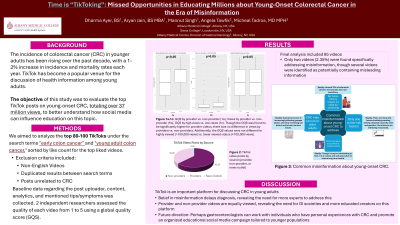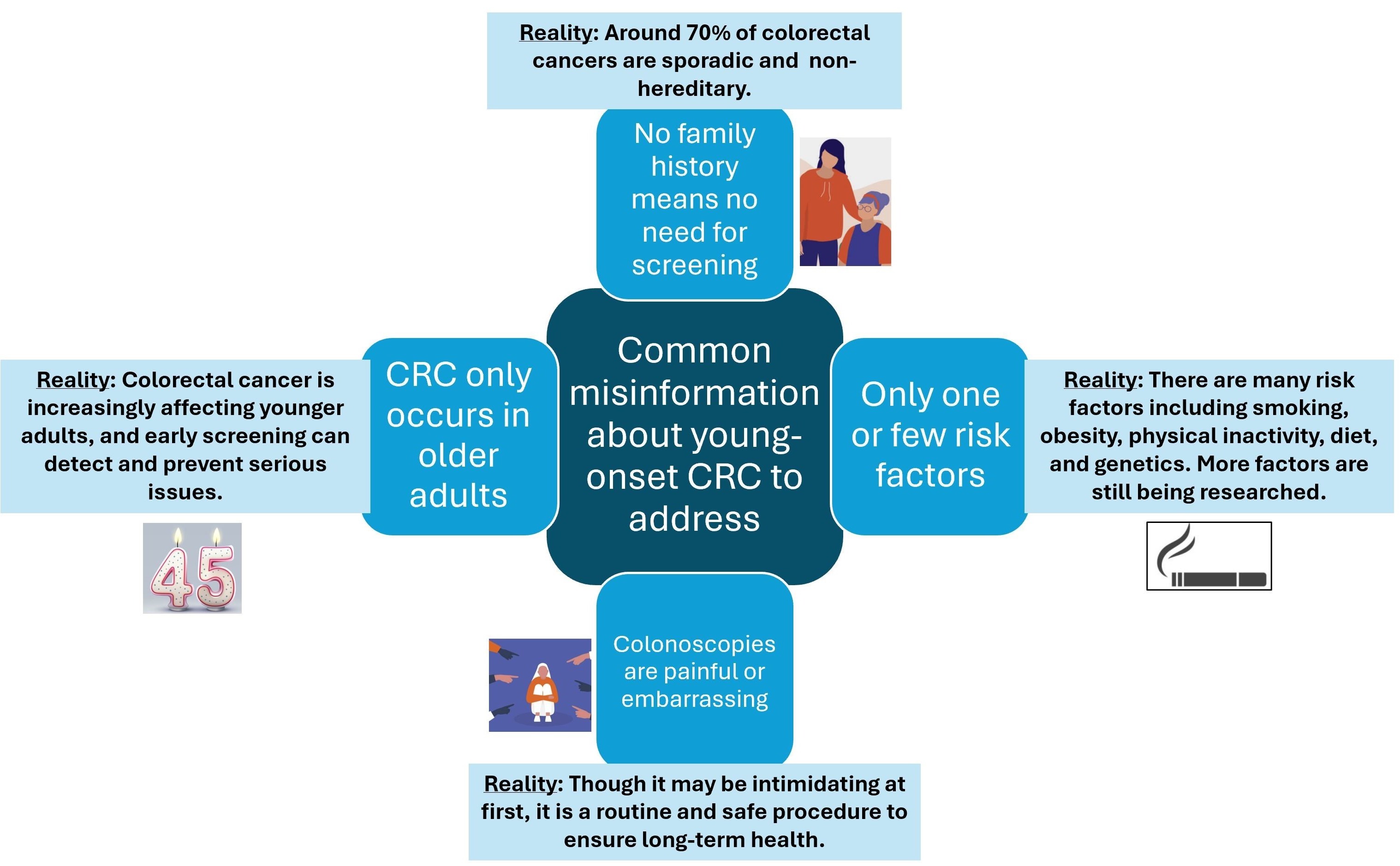Sunday Poster Session
Category: Colorectal Cancer Prevention
P0425 - Time is “TikToking:” Missed Opportunities in Educating Millions About Young Onset Colorectal Cancer in the Era of Misinformation
Sunday, October 27, 2024
3:30 PM - 7:00 PM ET
Location: Exhibit Hall E

Has Audio
.jpg)
Dharma Ayer, BS
Albany Medical Center
Albany, NY
Presenting Author(s)
Dharma Ayer, BS, Aryan Jain, BS, MBA, Mannut Singh, , Angela Tawfik, , Micheal Tadros, MD, MPH, FACG
Albany Medical Center, Albany, NY
Introduction: The incidence of colorectal cancer (CRC) in younger adults has been rising over the past decade, with a 1-2% increase in incidence and mortality rates each year. TikTok has become a popular venue for discussion of health information among young adults. The objective of this study was to evaluate the top TikTok posts on young-onset CRC to better understand how social media can influence education on this topic.
Methods: We aimed to analyze the top 80-100 TikToks under the search terms "early colon cancer" and "young adult colon cancer," sorted by like count for the top liked videos. Exclusion criteria included videos not in English, duplicated results between search terms, and posts unrelated to CRC. Baseline data regarding the post uploader, content, analytics, and mentioned tips/symptoms was collected. Two independent researchers assessed the quality of each video from 1 to 5 using a global quality score (GQS).
Results: 85 videos were analyzed with a total of over 37 million views. 62.35% videos were posted by individuals, 35.29% by providers, 2.35% by news outlets, and none by GI societies. Videos were classified as providing information about disease presentation (69.41%), raising awareness about rising cases (21.18%), or addressing misinformation (1.18%), with some under multiple categories (8.24%). 16.47% of videos by individuals discussed how misinformation led to a delay in diagnosis. However, only two videos posted by providers specifically addressed and educated patients about this misinformation (2.35%).
The GQS was higher for videos posted by providers vs. non-providers (p< 0.05), indicating better quality in provider-posted content. However, there was no significant difference in the number of views between videos posted by providers and non-providers. Furthermore, the GQS of videos was not significantly different between highly viewed videos ( >100,000 views) and lower viewed videos (≤100,000 views).
Discussion: TikTok is an important platform for discussing CRC in young adults. Individuals explain how belief in misinformation delays diagnosis, revealing the need for more experts to address this. Given that provider and non-provider videos are equally viewed, the need for GI societies and more educated creators on this platform is clear. Perhaps gastroenterologists can work with individuals who have personal experiences with CRC and promote an organized educational social media campaign tailored to younger populations.

Note: The table for this abstract can be viewed in the ePoster Gallery section of the ACG 2024 ePoster Site or in The American Journal of Gastroenterology's abstract supplement issue, both of which will be available starting October 27, 2024.
Disclosures:
Dharma Ayer, BS, Aryan Jain, BS, MBA, Mannut Singh, , Angela Tawfik, , Micheal Tadros, MD, MPH, FACG. P0425 - Time is “TikToking:” Missed Opportunities in Educating Millions About Young Onset Colorectal Cancer in the Era of Misinformation, ACG 2024 Annual Scientific Meeting Abstracts. Philadelphia, PA: American College of Gastroenterology.
Albany Medical Center, Albany, NY
Introduction: The incidence of colorectal cancer (CRC) in younger adults has been rising over the past decade, with a 1-2% increase in incidence and mortality rates each year. TikTok has become a popular venue for discussion of health information among young adults. The objective of this study was to evaluate the top TikTok posts on young-onset CRC to better understand how social media can influence education on this topic.
Methods: We aimed to analyze the top 80-100 TikToks under the search terms "early colon cancer" and "young adult colon cancer," sorted by like count for the top liked videos. Exclusion criteria included videos not in English, duplicated results between search terms, and posts unrelated to CRC. Baseline data regarding the post uploader, content, analytics, and mentioned tips/symptoms was collected. Two independent researchers assessed the quality of each video from 1 to 5 using a global quality score (GQS).
Results: 85 videos were analyzed with a total of over 37 million views. 62.35% videos were posted by individuals, 35.29% by providers, 2.35% by news outlets, and none by GI societies. Videos were classified as providing information about disease presentation (69.41%), raising awareness about rising cases (21.18%), or addressing misinformation (1.18%), with some under multiple categories (8.24%). 16.47% of videos by individuals discussed how misinformation led to a delay in diagnosis. However, only two videos posted by providers specifically addressed and educated patients about this misinformation (2.35%).
The GQS was higher for videos posted by providers vs. non-providers (p< 0.05), indicating better quality in provider-posted content. However, there was no significant difference in the number of views between videos posted by providers and non-providers. Furthermore, the GQS of videos was not significantly different between highly viewed videos ( >100,000 views) and lower viewed videos (≤100,000 views).
Discussion: TikTok is an important platform for discussing CRC in young adults. Individuals explain how belief in misinformation delays diagnosis, revealing the need for more experts to address this. Given that provider and non-provider videos are equally viewed, the need for GI societies and more educated creators on this platform is clear. Perhaps gastroenterologists can work with individuals who have personal experiences with CRC and promote an organized educational social media campaign tailored to younger populations.

Figure: Figure 1: Common Misinformation About Young-Onset CRC to Address
Note: The table for this abstract can be viewed in the ePoster Gallery section of the ACG 2024 ePoster Site or in The American Journal of Gastroenterology's abstract supplement issue, both of which will be available starting October 27, 2024.
Disclosures:
Dharma Ayer indicated no relevant financial relationships.
Aryan Jain indicated no relevant financial relationships.
Mannut Singh indicated no relevant financial relationships.
Angela Tawfik indicated no relevant financial relationships.
Micheal Tadros indicated no relevant financial relationships.
Dharma Ayer, BS, Aryan Jain, BS, MBA, Mannut Singh, , Angela Tawfik, , Micheal Tadros, MD, MPH, FACG. P0425 - Time is “TikToking:” Missed Opportunities in Educating Millions About Young Onset Colorectal Cancer in the Era of Misinformation, ACG 2024 Annual Scientific Meeting Abstracts. Philadelphia, PA: American College of Gastroenterology.
